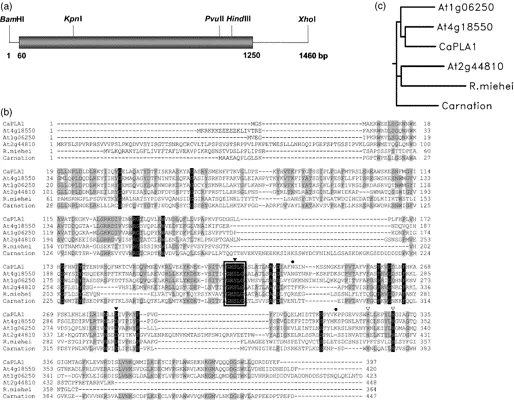Heterologous expression, and biochemical and cellular characterization of {CaPLA}1 encoding a hot pepper phospholipase A1 homolog
 Image credit: [Eunyu Kim]
Image credit: [Eunyu Kim]Abstract
Phospholipid signaling has been recently implicated in diverse cellular processes in higher plants. We identified a cDNA encoding the phospholipase A1 homolog (CaPLA1) from 5-day-old early roots of hot pepper. The deduced amino acid sequence showed that the lipase-specific catalytic triad is well conserved in CaPLA1. In vitro lipase assays and site-directed mutagenesis revealed that CaPLA1 possesses PLA1 activity, which catalyzes the hydrolysis of phospholipids at the sn-1 position. CaPLA1 was selectively expressed in young roots, at days 4–5 after germination, and rapidly declined thereafter, suggesting that the expression of CaPLA1 is subject to control by a development-specific mechanism in roots. Because transgenic work was extremely difficult in hot peppers, in this study we overexpressed CaPLA1 in Arabidopsis so as to provide cellular information on the function of this gene. CaPLA1 overexpressors had significantly longer roots, leaves and petioles, and grew more rapidly than the wild-type plants, leading to an early bolting phenotype with prolonged inflorescence. Microscopic analysis showed that the vegetative tissues of 35S:CaPLA1 plants contained an increased number of small-sized cells, which resulted in highly populated cell layers. In addition, mRNAs for cell cycle-controlled proteins and fatty acid catabolizing enzymes were coordinately upregulated in CaPLA1-overexpressing plants. These results suggest that CaPLA1 is functionally relevant in heterologous Arabidopsis cells, and hence might participate in a subset of positive control mechanisms of cell and tissue growth in transgenic lines. We discuss possible biochemical and cellular functions of CaPLA1 in relation to the phospholipid signaling pathway in hot pepper and transgenic Arabidopsis plants.